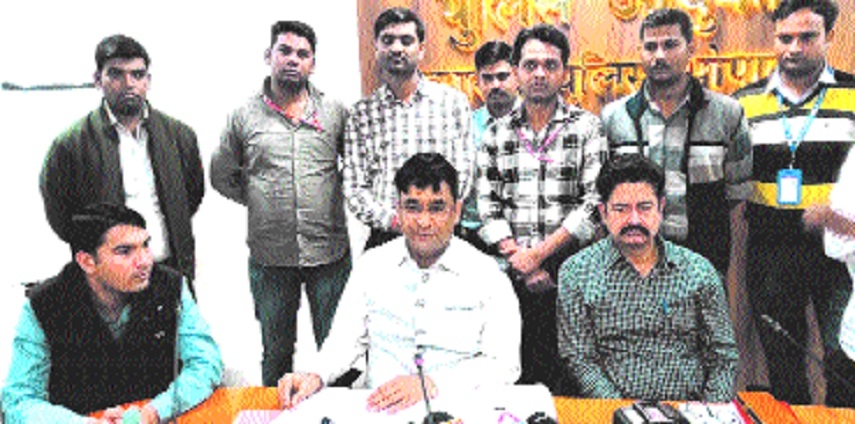Sensational Digital Arrest case First arrest of POS agent from UP’s Mahoba, one still at large
| Date :29-Nov-2024 |

Staff Reporter :
In a breakthrough in the digital arrest case, the Cyber Crime Branch of Bhopal has arrested an accused for fraudulently activating SIM cards, which were later used in various cybercrimes. The arrested individual, identified as Dheerendra Kumar Vishwakarma, was a POS agent with the private company and operated in rural areas of Mahoba, Uttar Pradesh.
As per information, Vishwakarma was involved in a scam where he activated multiple SIM cards using the Aadhaar card details of unsuspecting victims under the guise of helping them update their information. He would visit homes in different villages, promising free SIM cards, and then collect biometric data to activate two SIM cards at a time. While giving one SIM to the customer, he would keep the other for himself and sell it to a group of fraudsters involved in various illegal activities.
The investigation began after a complaint from Pramod Kumar, a 38-year-old field engineer working with Vodafone-Idea, who reported being targeted by the fraudsters. On November 12, Pramod received a call from an unknown number, with the caller claiming to be from the Telecom Regulatory Authority and informing him that a SIM card had been activated in his name in Mumbai and was being used in illegal activities.
Shortly after, Pramod received threatening social media messages claiming to be from the Mumbai Crime Branch and the CBI, demanding Rs 3.5 lakh to avoid arrest.
Fortunately, the quick response from the police prevented the scam from succeeding, and the victim was saved from losing a large amount of money. The case was registered under various sections, including the IT Act, and investigation into the matter was initiated.
The team of Cyber Crime District Bhopal then went to Kanpur, Mahoba for 7 days. On the basis of the evidences and technical analysis, Vikas Sahu, the holder of the calling mobile number used in committing the crime, was questioned. He told that POS agent Dhirendra Kumar Vishwakarma, promising to give a free SIM, scanned his Aadhaar card and face with his mobile and said that your SIM is not getting activated, you should get your finger print or face updated in your Aadhaar card. Then he activated the SIM by putting his thumb again (biometric) in the machine and gave it to me. Hence, the mobile number holder Vikas Sahu appeared before the honourable court and a statement was recorded, who confirmed before the court that he had been defrauded. While searching for the POS agent, technical information was obtained about the POS agent who used to activate SIM through fraudulent means, Dhirendra Kumar Vishwakarma. After making efforts on the basis of the information obtained, the team members arrested him from Mahoba in Uttar Pradesh. One mobile phone and three SIM cards used in the crime were seized. The arrested accused, Dheerendra Kumar Vishwakarma, is suspected of activating around 150 fraudulent SIM cards which were handed over to cyber criminals for a profit. The police seized a mobile phone, three SIM cards, and other evidence used in the scam during the arrest.
The police have also identified the person whose mobile number was linked to the fraudulent SIM cards, and further investigations are underway. Vishwakarma was arrested after a detailed investigation by the Cyber Crime Branch team, which had been working on the case for several days.
The authorities have warned the public to remain cautious of such scams and to report any suspicious activities immediately to avoid falling victim to similar frauds.
Priest duped of Rs 20 lakh by education counsellors
Staff Reporter
In a shocking case of cheating, a priest from the Bagsewania area of Bhopal has been duped of Rs 20 lakh by two education counsellors. The counsellors, Mohammad Nadeem Khan and Irfan Khan, had promised to secure admission for the priest’s daughter in a Russian university for an MBA course.
According to the police, Rajbahadur Dwivedi, a resident of Railway Colony, had approached the counsellors in 2022 to explore options for his daughter’s higher education. His daughter had failed to clear the NEET exam, and the counsellors suggested that she pursue an MBA from Mari University in Russia. They quoted a total fee of Rs 30 lakh for the entire course. The father was working as a priest in a temple. Rajbahadur paid the counsellors Rs 30 lakh in installments, but they deposited only Rs 10 lakh with the university and pocketed the remaining Rs 20 lakh. The priest and his daughter were unaware of the fraud until they received a notice from the university regarding pending fees.
When Rajbahadur contacted the counsellors to ask them to deposit the remaining fees, they started threatening him. The priest then approached the Bagsewania Police Station and lodged a complaint against the counsellors.
The police have registered a case and launched a search for the accused. “We have registered a case of cheating and intimidation against Mohammad Nadeem Khan and Irfan Khan,” said a police officer. “We are investigating the matter and will take action against the accused.”
In this case, the priest’s trust in the counsellors proved costly. “I trusted them because they were recommended by a friend,” said Rajbahadur. “I never thought they would cheat me.”
The police have advised students and parents to verify the credentials of education counsellors before dealing with them. “It’s essential to research the counsellor’s background and check for any reviews or testimonials from previous clients,” said the police officer.The incident has also raised concerns about the lack of regulation in the education counselling industry. “There is a need for stricter regulations to prevent such cases of cheating,” said an education expert. As the police investigate the matter, the priest and his daughter are left to deal with the consequences of the counsellors’ actions. “I hope the police take action against the accused and recover my money,” said Rajbahadur.


